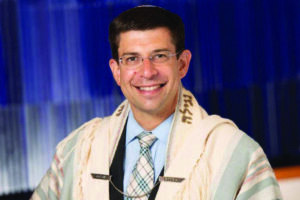
Rabbi Eric Yanoff
Parshat Chayyei Sarah
Years ago, during school pickup, I witnessed a frightening scene: A child wriggled free from his mother’s grasp and ran across traffic. I leaped toward the boy, but his mother got to him first, weaving through cars to the other side of the parking lot. I watched as she hugged her child close while simultaneously berating him:
“You could have been killed!” she shouted, holding her very much alive child. She scolded, and he cried — both of them emotional in the realization of his “almost harm.” What was the source of such an outburst? It was not relief over his being alive, but rather trauma from the knowledge that they had averted a true trauma. The potential was enough to cause strain.
The midrashic commentary on this week’s Torah portion, Chayyei Sarah, features a similar fear from “could-haves” — those potential moments of harm that reveal our vulnerability. The parshah begins with an account of Sarah’s death, but according to one version (Midrash Vayyikra Rabbah 20:2), Isaac first returns to his mother Sarah and tells her of his near-sacrifice in the Akeidah (Binding of Isaac), which we read last week. Upon hearing the tale from her alive-and-well son, Sarah dies. Rashi explains her death, “kime’at shelo nishchat — because he was all but slaughtered” (Rashi, Genesis 23:2).
In “Genesis: The Beginning of Desire,” Avivah Zornberg explains Sarah’s death by quoting the Maharal, another commentator: “This is the human reaction of panic, on realizing that only a small thing [the literal meaning of kime’at] separated one from such a fate.” She writes, “For [Sarah, Isaac’s] restoration does nothing to neutralize the terror” (Zornberg, 127, 132).
I recently returned from a rabbinic solidarity mission to Israel organized by the Fuchsberg Jerusalem Center. We witnessed the scene of Hamas’ criminal atrocities at Kibbutz Be’er. We gave strength to reservists from Israel’s Military Rabbinate who are still halachically identifying remains, and we hugged and smiled when, as we were leaving the facility, we learned that in a daring mission, Israel had rescued one of the hostages. We packed boxes of donated supplies to go to displaced families across Israel. We met with Jon Polin and Rachel Goldberg, whose son Hersh was taken captive and is in Gaza.
The loss in Israel is palpable — and in addition to mourning, in those moments and more, we joined Israelis in confronting our vulnerability as Jews. Indeed, in a humbling interchange, one Israeli friend, unprompted, asked what Israel could do for us, given our uncertainty about being Jewish in an age of rising antisemitism in the Diaspora.
On Oct. 7, many people died, but for Israelis and Jews worldwide, what also died was that innocent sense of security, the false assumption of immunity from fear and danger. Our memorial prayer alongside the ruins of a house in Kibbutz Be’eri mourned this collective emotional loss as well as the unimaginable human loss.
Israel will rightly exercise strength to defend herself and deter future crimes against the people of Israel, but I wonder: How will we recover from this deep emotional loss?
For all of us in our current world, a misleading veil of security has been removed. We see the “could-haves” that always existed; we now confront a constant underlying fear that once only occasionally reared its head to pierce happier, simpler times.
This veil is a beautiful metaphor in our parashah, as well: The rabbis recognize Rebecca’s role in comforting Isaac after the loss of his mother. In many ways, she takes the place of Sarah in his life, restoring a sense of normalcy and calm. And how does she first do this? By her immediate replacement of a veil.
In our lives, and certainly on my recent Israel solidarity mission, I offered (and unexpectedly received) comfort and strength to and from our Israeli brothers and sisters who are confronting a newly rediscovered vulnerability, mourning the veil that had once obscured such real-world fears and horrors borne by hatred.
And so, with a realization of our basic fragility, but with a hope for security and comfort, let this be our prayer: May the fears and “could-haves” and very real and tragic losses of recent weeks redouble our resolve to do all that is difficult and perhaps unpopular — but necessary — to reaffirm the sanctity of life, security and peace.
Rabbi Eric Yanoff is in his “bar mitzvah year” as rabbi at Adath Israel in Merion Station. The Board of Rabbis of Greater Philadelphia is proud to provide diverse perspectives on Torah commentary for the Jewish Exponent. The opinions expressed in this column are the author’s own and do not necessarily reflect the view of the Board of Rabbis.





